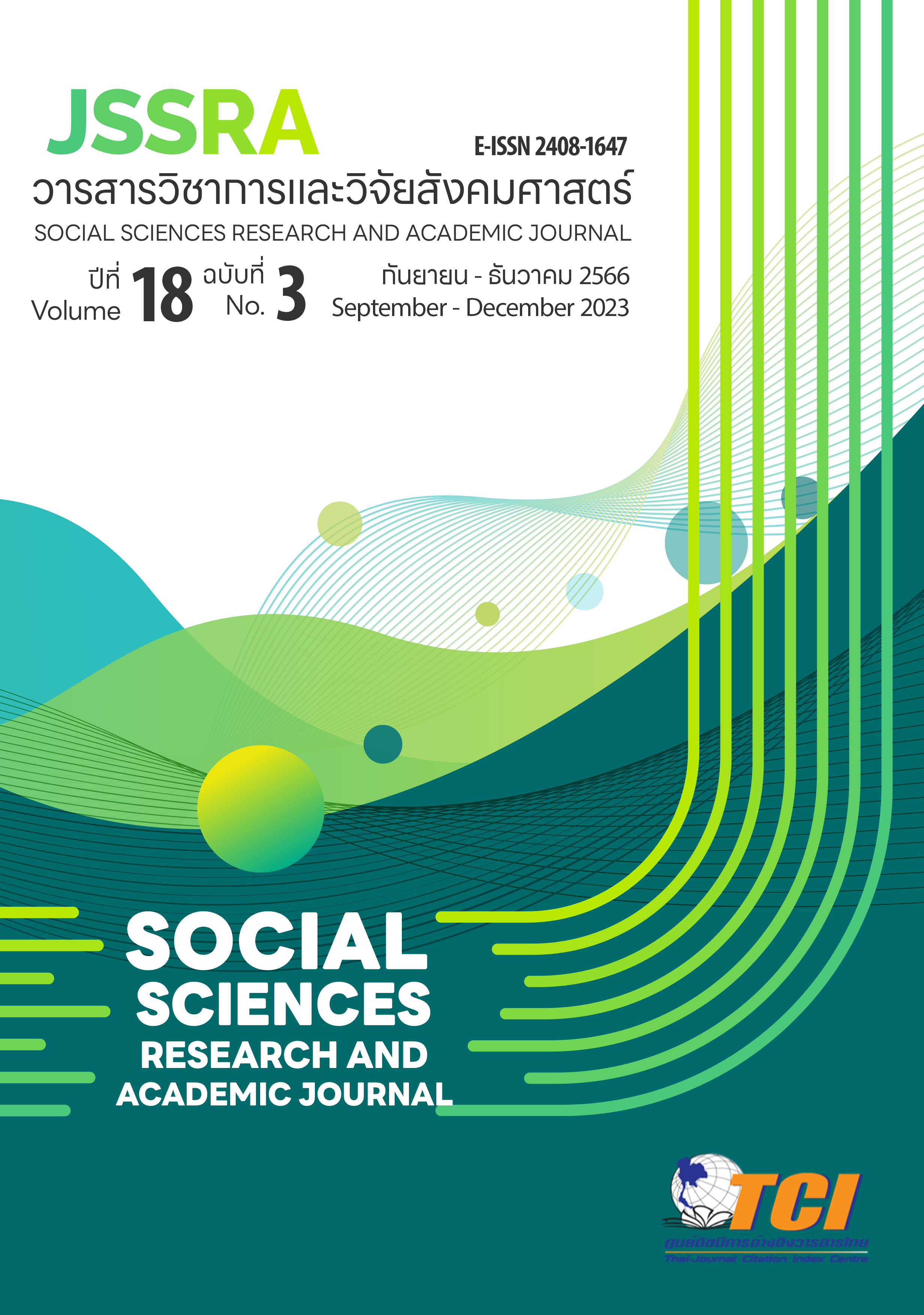การพัฒนาทักษะการเขียนจดหมายอิเล็กทรอนิกส์ภาษาอังกฤษของนักเรียน มัธยมศึกษาตอนต้นโดยการสอนการประยุกต์ใช้ Google Translate และเครื่องมือออนไลน์ประเภทต่าง ๆ The Development of the English Email Writing Skills of Lower Secondary School Students through the Instruction of the Integration of Google Translate and Other Online Tools
Main Article Content
Abstract
The objective of this study were; 1) to compare the English writing skills of lower secondary school students in Bangkok Metropolitan between before and after learning to integrate the Google Translate application and other online tools, 2) to investigate the satisfaction of lower secondary school students in Bangkok Metropolitan who are continuing their education by incorporating Google Translate and other online tools. The participants were 35 students from Mattayomsuksa two students, Wat Sakae Ngam School, Bangkok, and Academic year 2023, selected by using cluster random sampling. The instruments used in the study were lesson plans, E-mail writing tests (Pretest/Posttest), and a satisfaction questionnaire to determine the level of student satisfaction with the learning provision based on the integration of Google Translate and other online tools. Quantitative methods were used to analyze the data.
This study yielded the following results: 1. The English Writing of students was enhanced by integrating Google Translate. 2. The testing score after learning with the approach was statistically higher than before learning with the approach at the .05 level. 3. The overall result of the students’ satisfaction toward learning provision by integrating of Google Translate and other online tools was at high level.
Article Details
References
คอลีเย๊าะ เจ๊ะโด. (2560). ความพึงพอใจต่อการสอนภาษาอังกฤษตามแนวการสอนเพื่อการสื่อสารสำหรับนักศึกษารายวิชาภาษาอังกฤษ มหาวิทยาลัยราชภัฏยะลา. วิทยานิพนธ์ปริญญาครุศาสตรมหาบัณฑิต มหาวิทยาลัยราชภัฏยะลา: ยะลา.
ชัยวัฒน์ บวรวัฒนเศรษฐ์. (2559). Instructional Strategies Based on Scaffolding Theory. Prae-wa Kalasin Journal of Kalasin University, 3(2), 154-179.
ทิศนา แขมมณี. (2551). ศาสตร์การสอน. กรุงเทพฯ: สำนักพิมพ์จุฬาลงกรณ์มหาวิทยาลัย.
ธีระชน พลโยธา. (2560). การวิจัยและพัฒนาความฉลาดทางวัฒนธรรมในบริบทวัฒนธรรมอาเซียน สำหรับนิสิตนักศึกษาระดับปริญญาตรี. วิทยานิพนธ์ศึกษาศาสตรมหาบัณฑิต. มหาวิทยาลัยศรีนครินทรวิโรฒ: กรุงเทพฯ.
ปาริฉัตร พินิจวิญญูภาพ และ กชกร ธิปัตดี. (2563). การพัฒนาทักษะการเขียนภาษาอังกฤษด้วยการเขียนแบบเน้นกระบวนการ สำหรับนักเรียนชั้นประถมศึกษาปีที่ 4. Journal of Roi Et Rajabhat University, 14(2), 105-113.
รัชดาภรณ์ พิมพ์พิสิฐถาวร. (2561). การพัฒนาความสามารถในการเขียนภาษาอังกฤษด้วยแบบฝึกทักษะสำหรับนักเรียนชั้นประถมศึกษาปีที่ 5. วิทยานิพนธ์ศึกษาศาสตรมหาบัณฑิต. มหาวิทยาลัยศิลปากร: กรุงเทพฯ.
วิรงรอง สำเภาทิพย์. (2561). การพัฒนาทักษะการเขียนภาษาอังกฤษในระดับชั้นมัธยมศึกษาปีที่ 5 ด้วยวิธีการเขียนแบบร่วมมือ โดยใช้โปรแกรม Google Docs. วิทยานิพนธ์ศึกษาศาสตรมหาบัณฑิต. มหาวิทยาลัยเกษตรศาสตร์: กรุงเทพฯ.
สำนักวิชาการและมาตรฐานการศึกษา, กระทรวงศึกษาธิการ. (2553). แนวทางการจัดกิจกรรมพัฒนาผู้เรียนตามหลักสูตรแกนกลางการศึกษาขั้นพื้นฐาน พุทธศักราช 2551. กรุงเทพฯ: โรงพิมพ์ชุมนุมสหกรณ์การเกษตรแห่งประเทศไทย จำกัด.
วรางค์ โคว้ตระกูล. (2550). จิตวิทยาการศึกษา. กรุงเทพฯ: สำนักพิมพ์แห่งจุฬาลงกรณ์มหาวิทยาลัย.
Boonmoh, A. & Kullavichian, I. (2023). A study of Thai EFL learners’ problems with using online tools and dictionaries in English-to-Thai translation. Kasetsart Journal of Social Sciences, 44(2), 497-508.
Boonmoh, A. (2021). Use of dictionaries and online tools for reading by Thai EFL learners in a naturalistic setting. Lexikos, 31(1), 239-258.
Bowker, L. (2020). Chinese speakers’ use of machine translation as an aid for scholarly writing in English: a review of the literature and a report on a pilot workshop on machine translation literacy. Asia Pacific Translation and Intercultural Studies, 7(3), 1-11.
Lee, S. (2019). The impact of using machine translation on EFL students’ writing. Computer Assisted Language Learning, 33(3), 157-175.
Napu, N. & Hasan, R. (2019). Students’ Difficulties in Translating Academic Essay: Beginning Translators’ Perspectives. Scholars International Journal of Linguistics and Literature, 2(8), 137-141.
Sahail, M. Asassfeh. (2012). Communicative Language Teaching in an EFL Context: Learners' Attitudes and Perceived Implementation. Journal of Language Teaching and Research, 3(3), 525-535.
Stymne, S. (2011). Blast: A Tool for Error Analysis of Machine Translation Output. In Proceedings of the ACL-HLT 2011 System Demonstrations, P. 56-61, Portland, Oregon.
Tsai, S. C. (2020). Chinese students’ perceptions of using Google Translate as a translingual CALL tool in EFL writing. Computer Assisted Language Learning, 35(5-6), 1250-1272.
Vygotsky, L. S. (1978). Mind in society: The development of higher psychological. processes, Cambridge, MA: Harvard University.
Wink, J., & Putney, L. (2002). A Vision of Vygotsky, Boston, MA: Allyn & Bacon. Two Senses of the Term Social, 60-63.


